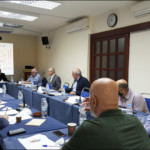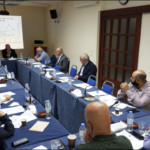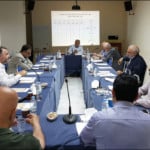Al-Zaytouna Centre for Studies and Consultations held a panel discussion entitled “The Impact of the Israeli Elections on the Palestinian Situation,” on 2/5/2019, with the participation of experts and specialists in Palestinian affairs.
The discussion was kicked off by the General-Manager of al-Zaytouna Centre Prof. Dr. Mohsen Mohammad Saleh, welcoming the attendees, reviewing the most important results of the Israeli 21st Knesset. Saleh posed several questions concerning the implications of the victory of the Likud Party and the Israeli right, the decline of the “Israeli left,” and how would that effect the formation and program of the next Israeli government, which will have a direct impact on the Palestine issue, the deal of the century and the Arab environment, the peace process, the potential of a war on Gaza Strip (GS), and the future of the Palestinian Authority (PA). He posed some questions concerning the performance of the Arab political elite and parties among the 1948 Palestinians, and the impact of the election results on the conditions of the 1948 Palestinians and their future. Saleh asked also about the effect of these elections on the “northern front” with Lebanon and Syria, the Iranian dossier, the understandings in GS, and if these understandings were meant to pressure Iran.
According to the final results of the Israeli elections, the participants expected Netanyahu to win a fifth term as prime minister. This is a major achievement in the Israeli political environment, which is characterized by a large number of parties, plenty of splits and mergers, and much maneuvers and political harassments, in addition to a great ability to coexist within the Zionist project. Panelists saw that the general course of elections during the past twenty years indicates that the Israeli society has become more right-leaning and extreme; while the “left” camp has become more fragmented and secluded, and it has even become right in some aspects, even adopting “right” views and arguments.
At the same time, we must note here that in Israel the right, left, and the middle, do not necessarily reflect the common academic terms and connotations. They are only used to make things clearer, while the “Synthetic Zionism” doctrine, which seeks to uplift the Jewish Zionist status, is the one ruling everybody.
Netanyahu has benefited from his “achievements” at the Israeli political and economic levels, and from the US intervention presenting him a historic achievement amidst the elections, which was recognizing Israel’s sovereignty over the Golan Heights occupied in 1967. It was also noteworthy that just before the elections, the Russians handed over the remains of an Israeli soldier to Israel, whose corpse had been buried in Syria for the past 37 years. This indicates that the great powers supported Netanyahu, and made significant steps when opinion polls showed that Benny Gantz (Blue and White party) was taking the lead.
As for the 1948 Palestinians, the participants in the panel discussion indicated that these are outside the Zionist-Jewish consensus; For Netanyahu’s slogan was “Bibi or Tibi,” while Benny Gantz, the Blue and White party leader, who needed the votes of the Arab blocs used to say the Arabs are out. The 1948 Palestinians themselves were confused; they did not adopt a common political direction, for there are sectarian and familial divisions. In the universities, the desire for unity was much higher, however, the Palestinian society in the villages is a traditional one, and that played a major role making Arab party alliances fail. Furthermore, in the latest elections, the Arab parties failed to unite in one electoral list, consequently, Arab participation in the elections was weak, and the status of the Arab parties in the Knesset declined, losing three seats when compared to the 2015 elections. In addition, there was an Arab boycott of the elections due to the frustration from the performance of both the Arab political and party elites, and the frustration from the deteriorating conditions of the Arab society in Israel, especially after the Jewish Nation-State Law was passed by the Knesset.
Concerning the deal of the century, the participants pointed out that the right-wing parties reject it, hence, this is an issue for bargaining; either the government will be a defensive one against the accusations that Netanyahu faces, or it would be a pro-deal of the century government. With the former, Netanyahu will be able to face the charges against him when they become official. He is betting that a pure right-winged government would provide him with immunity, and the Knesset majority would support him, and with such a government there is no hope for a peace settlement with the PA. We are facing a government that is more radical, advocating for more settlement building and annexations. Concerning GS, Netanyahu was clear that he is against anything that would annex GS once more, in addition, there is no Israeli interest in any military confrontation with the strip. However, the only choice Palestinians have is resistance, for if the Israelis felt that they are not paying any price, they would not offer anything. The panelists opined that Jerusalem and the West Bank (WB) are the title of the next phase, hence the Palestinian side must be ready to face the upcoming challenges, while awaiting better conditions.
The northern front won’t be affected by the latest Israeli elections, where the same consensus security policy would be implemented, and forming a new government will not have direct impact on that. Any new developments are linked to new events on the ground. For the Israelis, the current equation they established are making gains on the Syrian front, because they are not paying any price, however, it won’t succeed in getting his opponents out of the arena. Therefore, they are making limited qualitative hits, ensuring at least that the red lines will not be trespassed.







Leave A Comment